Alberta ASETS forum sees collaboration among Treaty Nations
Originally printed in December 2015 Edition Volume 32 Number 12

by John Copley
(ANNews) – The first and so far only winter storm to hit the Capital Region this season did so on November 24, and though it caused a minor delay to the start of the two-day 2015 Alberta ASETS Forum, it didn’t put a damper on the spirits of the many people who attended the event, some driving through the snow from as far away as the Blood Reserve in southern Alberta.
The employment strategies symposium was organized, co-sponsored and hosted by the Six Independent Alberta (Treaty 6) First Nations Society (SIAFN); other sponsors included the Tribal Chiefs Employment and Training Services, NAIT, Interior Heavy Equipment, YTED ASETS, Service Canada and the Government of Alberta.
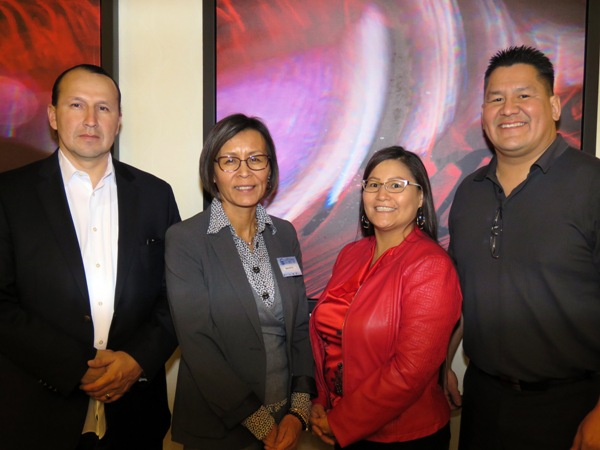
(l-r) Treaty 6 Grand Chief Chief Tony Alexis, Gina Potts COO of A3 Limited, SIAFN Executive Director Charlene Bruno and Derantech President Mike Deranger.
“This year’s Forum was very successful,” noted SIAFN Executive Director Charlene Bruno, who said the 2015 event, the first since 2012, “drew more than 120 professionals, business leaders and Chiefs from across Treaties 6, 7 and 8.”
Bruno said the November 24-25 Forum, held at the Double Tree by Hilton, “provides an ideal opportunity” for the province’s “three Treaty Groups to collaborate, share best practices, discuss upcoming opportunities and showcase First Nation businesses, entrepreneurs and employment strategies/partnerships. It is an excellent opportunity for our Nations to network and exchange ideas on what’s working in our programming. ASETS plays a vital role in our communities in that it works to increase self sufficiency.”
“All Aboriginal Skills Employment and Training Strategy Stakeholders play an essential role in our communities to get our people trained and transitioned into employment,” noted SIAFN President Shannon Houle. “With more than 20 years of ASETS experience and challenges we are all well aware of the three pillars of success that ASETS is founded on – ensuring demand-driven skills development, forming partnerships with private sectors, provinces and territories and emphasizing greater accountability to achieve the best possible results. These pillars have their challenges, but as we serve the fastest growing population in Canada with the fullest potential and historically the hardest working population, I know and believe we can succeed because of the demand, diligence and dedication of hard-working people like you at the helm.”
Houle spoke about her first employment opportunity noting that “I was just a young, naive and impressionable Nehiyaw woman trying to find her place in society” when she got a summer job via a sponsorship through the ASETS partnership at the local human resources office, “now known as the Saddle Lake Training and Employment Centre.”
She spoke about the important role that employers, sponsors, mentors, Elders and others have when it comes to working with young people seeking their first encounter in the working world.
“My first job wasn’t a glamorous job; picking up garbage and helping to beautify our local lakes, beach and camping area. At 15 the only joy was being outside in the sun and being with my peers. When I got my first cheque I was so proud and excited – my own money that I worked for – like any teenager I spent that first cheque foolishly. It was empowering, it was liberating, and it gave me a sense of freedom. I know many of you are working with youth and older adults trying to find their way – but remembering those powerful feelings” of earning that first cheque “reminds me about the important role that you all play in being a part of an experience that helps to empower, guide and see (our young people) succeed.
“You all play such an important role in so many lives and for some, their first interaction with you is what helps them reach for their goals because a job is more than that; it’s a career – a place where many of us spend at least eight hours a day and sometimes more hours in a day than we spend with our families and friends. That’s why your roles are so crucial. The message I want to share with you is that as our people face old challenges and take on new ones in this ever-changing economic climate, they need you to help them find their place so they can fulfill their role in society. We have to always remember where we come from and where we want to go. Before contact we were a 100 percent working people; with your help and the help of people like you, we can get there once again.”
Treaty 6 Grand Chief Tony Alexis talked about the important work being done in the communities to ensure that people are being trained and mentored and the significance of passing along ideas and strategies to the leaders and Chiefs of the communities so they in turn can fight for better conditions, better resources and better opportunities than what is now available.
“Filter your information and findings across to your leaders so they can be more effective in negotiations with government. Right now the way it works is that government is going to decide what the best strategy is going to be, how much money they have, how many resources they will offer and then say ‘that’s what’s available – work with it.’ That’s the way government has operated since the residential school days and the 60s Scoop. They continue to say they have the best answer – ‘we’ve studied all your data and from that data we are going to contribute x-number of dollars to build your community’ – all without realizing how it works in the community. They look at the numbers, at the percentages of what it costs to get a person employed and then determine what that success factor is. When we look at it from the national level the Assembly of First Nations, our Chiefs should be bringing your information and input forward. Sometimes the government feels that Service Canada is not a treaty issue but the truth of the matter is that everything is, everything relates to who we are as a people. Everything relates to our ground, to our land, to our Elders.
“To the government it’s about statistics, economics, commerce; to us it’s about the core of who we are; it begins with the Creator and the spirit of the people and the gifts we have as a people. It’s important as technicians that you get your information to your leaders, to the Chiefs and Councils so they can bring these arguments to the regional and national level. Right now we are not hearing what it is you need to fight for, what it is you need to stand for. As technicians I encourage you to continue to do the good work that you do in supporting and helping the people in your community – keep reaching out to them. Right now in our nations we are at a point where we are succeeding more than ever. If you focus on the negative you may not see it but if you look at the good stories you’ll see that we have evolved to a place that when the next opportunity comes to us, it is going to be good for all of us. Those here today are succeeding as are many others in our communities; today we need to encourage our people, we need to help them replenish the energy and the spirit that we have here today. We have more academic educators than ever and on top of that we have people who are practicing their culture, their languages and their songs. It’s a new beginning, it’s a new day and we are in a good place so let’s work together, move together and give thanks to one another as we move forward.”
The two-day event heard from numerous speakers and presenters representing organizations and companies that included the Alberta Indian Investment Corporation, Blood Tribe, Trade Winds and NEAAI, Interior Heavy Equipment Operator School, Nautuasis Safety Services, Derantech Welding, Junior Forest Rangers, Saddle Lake Employment and Training Maskwacis Employment Centre, Driftpile First Nation Training and Employment and more.
“Earlier this spring we were trying to find a way to bring additional training initiatives to our Saddle Lake community,” explained Andy Redcrow, Saddle Lake Cree Nation Director of Human Resources. “We wanted to provide some heavy equipment training and that is a very costly endeavour. We learned that there could be funding available from a Canada-Alberta Job Grant program and after speaking with the Saddle Lake administration and our Public Works department we came up with a proposal and applied for the grant.”
Various departments and entities on the First Nation participated in the initiative and in mid-July the money was approved and training commenced two months later. The program was taken by 10 band members, all of whom passed. Eight are currently employed by Public Works and two others were hired elsewhere. The band provided two of the trainers; both had years of experience on heavy equipment. Interior Heavy Equipment School, with training sites in B.C and in Alberta provided the equipment and the extra trainers.
“We trained 10 people,” noted Redcrow, “on equipment that included graders, caterpillars, scrapers, front-end loaders and gravel trucks. Our driver training program also taught classes and graduated two Class 3 drivers” who are now operating gravel trucks. The Canada-Alberta Job Grant paid for two-thirds of the training costs with the Saddle Lake First Nation picking up the rest of the tab.
“We also wanted to train some of the people who work for administration,” added Redcrow, explaining that about 400 people are employed through Saddle Lake administration. “We looked at various options and in the end partnered with NAIT; some of our staff went on to take computer training as well as book-keeping and accounting.” Once the guidelines for funding were clear and fully understood, “it only took about a month to process the paperwork” and attain the grant.

Forum participants Sandee Willier and Colleen Courtoreille work with employment strategies on the Driftpile First Nation.
Various employment and training program leaders were also on hand to talk about their policies and procedures; each was similar in what they do and what they offer.
Colleen Courtoreille said the programs and services available through Driftpile First Nation’s employment service “are geared toward strengthening clients, increasing independence and building strong support networks” to help facilitate the process. “The employment services motivate, assist and support individuals and work with them as they choose their occupational direction. We help our clients develop a career path and then help them to attain the skills they’ll need to find employment and maintain long-term stability.”
“I’d like to thank and applaud everyone who attended this year’s Alberta ASETS Forum,” said SIAFN President Shannon Houle. “Thank you for making this Forum a success and for sharing your community’s best practices. The opportunity to work together and learn together enables us all to walk away feeling fulfilled and accomplished. I wish you all warmth and joy during the upcoming holiday season.”
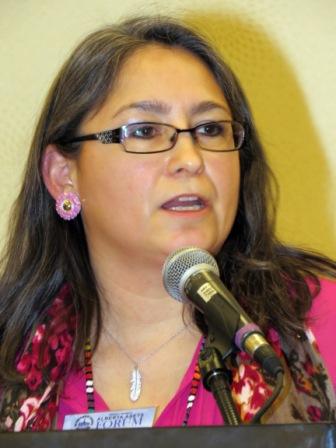
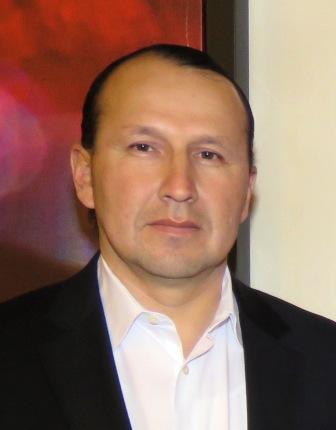
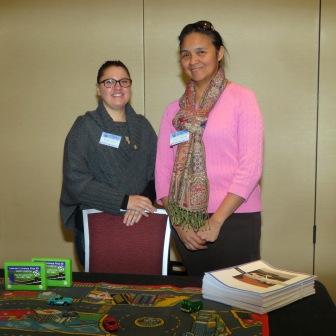
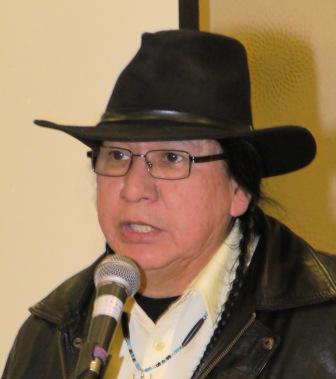
No comments:
Post a Comment